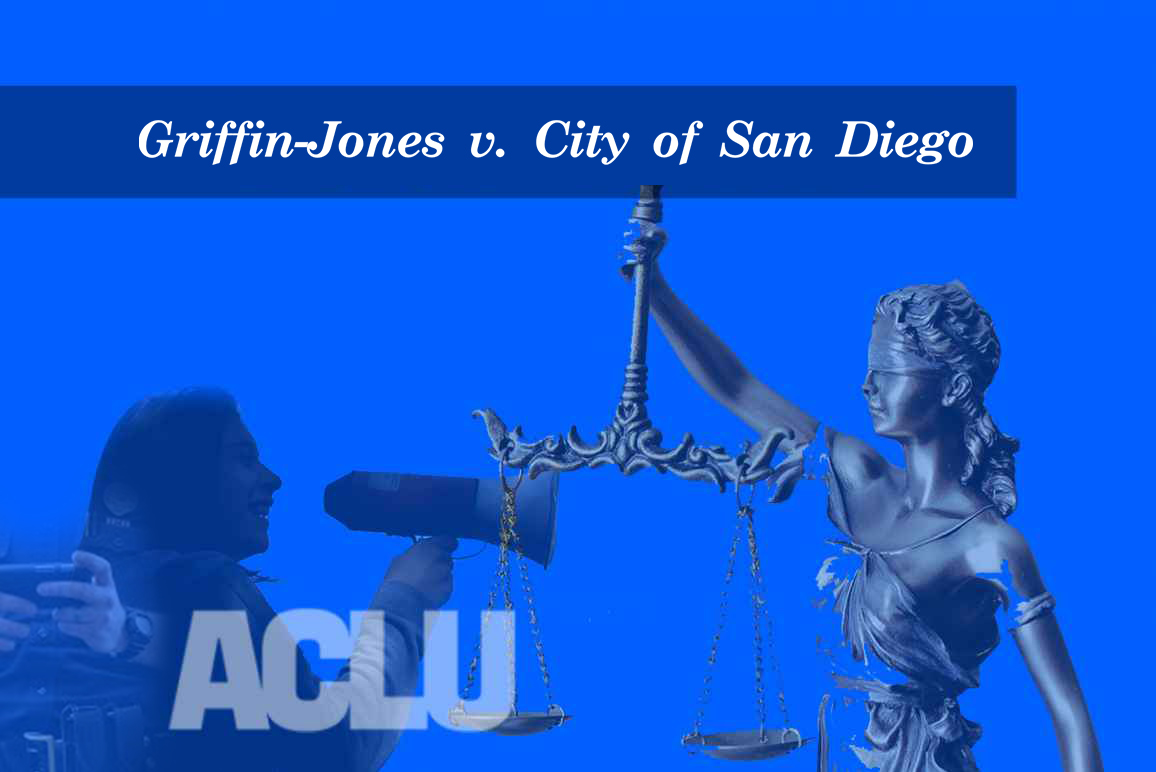Join our EmpowerEd series!
EmpowerEd(ucation) is a 3-track education series focused on policing, education and housing equity, and immigration policies and practices.
Griffin-Jones v. City of San Diego
- Filed: 01/07/2021
- Court: SOUTHERN DISTRICT OF CALIFORNIA
- Latest Update: Jan 07, 2021

Police Seizure of Protesters’ Cell Phones
In the weeks and months after George Floyd was murdered in Minneapolis, Minnesota, and after police shot and killed Breonna Taylor in her home in Louisville, Kentucky, tens of millions of people took to the streets to protest racist police brutality, making the Black Lives Matter movement one of the largest social movements in American history. That movement has been fueled, in part, by cell phone video, which has made it possible for ordinary people to document and bear witness to atrocities that would otherwise be denied or ignored, and to share their documentation with national and global audiences, sparking national and even global public outrage.
The centrality of cell phone video to recent protests made it particularly disturbing to learn that San Diego Police Department officers had seized protesters’ phones after arresting them at anti-police brutality protests, and had refused to return them for weeks or months after the protesters were released from jail.
This federal lawsuit was litigated by the ACLU Foundation of San Diego & Imperial Counties (ACLUF-SDIC), Community Advocates for Just and Moral Governance (MoGo), and Singleton, Schreiber McKenzie & Scott Law Firm (SSMS), and Mintz, Levin, Cohn, Ferris, Glovsky and Popeo, P.C., on behalf of Plaintiff Christina Griffin-Jones, whose cell phone was seized when she was arrested by San Diego Police Department (SDPD) officers during an anti-police violence demonstration on Sept. 23, 2020. While she was released the following day, she did not receive her phone until after this lawsuit was filed. When it was finally returned to her, it was broken.
The prolonged seizure of Ms. Griffin-Jones’ phone followed a similar incident earlier in the summer of 2020. On Sept. 24, 2020, ACLUF-SDIC, MoGo and SSMS sent a letter to the police department demanding the immediate return of phones seized from protesters at an Aug. 28 protest against the police shooting of Jacob Blake in Kenosha, Wis., which was recorded on a cell phone. The letter explained that a warrant is generally required to search a cell phone, and law enforcement agencies must promptly seek search warrants for impounded property. Otherwise, prolonged seizure of the property is unconstitutional.
Responding to the letter more than a month after the phones were taken from protesters, SDPD contended that “phones which are impounded as evidence will remain in our custody and if the contents are going to be sought, a detective will request a search warrant from a judge as required by law.”
This response, coupled with the later seizure of Griffin-Jones’ phone indicated that SDPD continued to believe it had the authority to maintain possession of protesters’ phones for an indefinite period of time, and that there was no urgency to decide whether to seek warrants to search them, contrary to individuals’ statutory and constitutional rights.
The centrality of cell phone video to the Black Lives Matter movement makes clear that when police seize and unlawfully maintain possession of people’s phones, they are striking at the heart of one of the most important struggles for social justice in our lifetimes. Moreover, people’s cell phones carry troves of personal, private information that must be protected from law enforcement agencies’ illegal and unconstitutional intrusions.
As Trenton Lamere, an associate with SSMS, said when we filed this suit: “From banking and healthcare to food deliveries and rideshares, people rely on cell phones like never before. Courts and legislatures have rightly determined that cell phones deserve special protections.” This suit was necessary “to ensure SDPD and all other law enforcement agencies respect our client’s constitutional rights and comply with the laws on seizing cell phones.”
The lawsuit asked for the immediate return of Griffin-Jones’ phone and for monetary damages. We argued that SDPD officers, polices, and practices violated Griffin-Jones’ rights against unreasonable seizure of her property, and her due process rights, under the Federal and California constitutions, and were also out of compliance with state law.
But the issue always went beyond the facts of this immediate case. The stakes were made clear by MoGo Executive Director Geneviéve Jones-Wright, who noted that “it is important to understand that what happened to our client is not an isolated incident. The illegal seizure of protesters’ cell phones now appears to be a common practice and a tool for repression. I am afraid that law enforcement, including SDPD, is using this tactic to intimidate and discourage protesters and organizers in an effort to silence them. Whatever the purpose behind the actions, the actions are not lawful. This is why it is important for lawyers to step up and protect our cherished constitutional freedoms.”
Press releases: https://www.aclu-sdic.org/en/press-releases/lawsuit-filed-federal-court-challenging-sdpds-prolonged-seizure-protesters-cell-phone
- 01/07/2021 2021_01_07_3_prelim_inj_mtn_filed.pdf
- 01/07/2021 20021_01_07_1_griffin-jones_complaint.pdf
Date Filed: 01/07/2021
Court: SOUTHERN DISTRICT OF CALIFORNIA
Affiliate: CD
Download documentDate Filed: 01/07/2021
Court: SOUTHERN DISTRICT OF CALIFORNIA
Affiliate: CD
Download documentStay Informed
Sign up to be the first to hear about how to take action.
By completing this form, I agree to receive occasional emails per the terms of the ACLU’s privacy statement.
By completing this form, I agree to receive occasional emails per the terms of the ACLU’s privacy statement.
